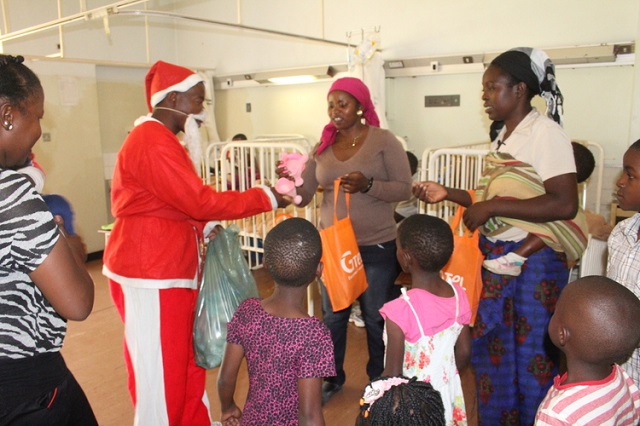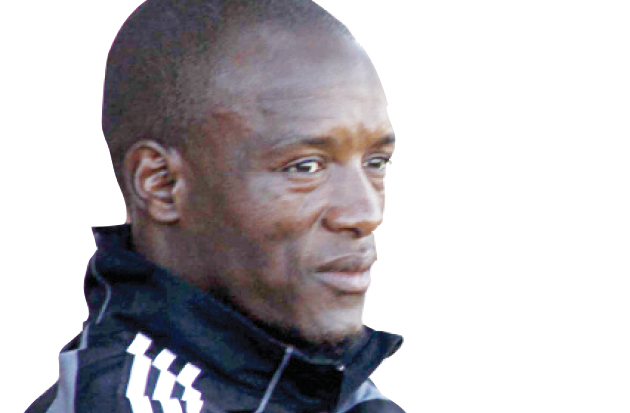Remembering families battling cancer
Leroy Dzenga, Harare Bureau
Natsai Jengwa (not her real name) sat in the outpatients section at Parirenyatwa Group of Hospitals in Zimbabwe’s capital, Harare, starring at the ceiling as she waited for her turn to be served.
Her wry smile captured the emotions of a child who has not been home in months, four to be precise.
She has been in and out of the child cancer ward since she was diagnosed with Acute Lymphoblastic Leukaemia earlier this year.
Thankfully, she has been responding well to medication, a prospect which has seen her look forward to this year’s festive season.
Like any other child her age, she expects to be showered with niceties characteristic of the Christmas period.
“I would like a doll, a ball and lots of food. I hope I will get a lot of presents and would like to eat rice and potatoes,” Natsai said.
As she spoke, she made emphasis of how she had missed her grandmother back in Rusape where she hails from.
“I had made two friends here, Tanya and Lorraine I hate that I will not be able to play with them. I am confused, I want to go see my grandmother but I do not want to leave my two friends,” said Natsai with a smile.

Kidzcan Zimbabwe threw a Christmas party for children battling cancer at Parirenyatwa Group of Hospitals. They were partnered by G-Tel, Arenel Bulawayo, St Michael’s Presentation School and ZB Bank
She is fortunate to be going home, unlike hundreds who will spend their festive season in a hospital ward trying to defeat the coward cancer disease which attacks even the innocent and unassuming.
In a bid to comfort children and parents who will be out of their natural abodes, Kidzcan Zimbabwe holds an annual Christmas party meant to remind them that they are not alone in the fight against cancer.
Kidzcan Zimbabwe is an organisation whose niche is increasing the survival rate of children with cancer.
For this year’s Christmas party they roped in corporate partners who collaborated to bring presents to all children admitted at the Parirenyatwa Hospital paediatric ward.
These partners include G-Tel, Arenel Bulawayo, St Michael’s Presentation School and ZB Bank.
“As Kidzcan Zimbabwe, we hold these parties annually to give gifts to all admitted patients in the children’s wards. This year every child got a present, not just in the cancer wards but within the whole hospital,” Maradzika said.
“As part of our service we provide psycho-social support. This is where we try and uplift the spirits of those who are affected by cancer in one way or the other,” said Maradzika.
There have not been enough conversations around cancer in Zimbabwe, it is still being considered a taboo.
“We need to talk about cancer, people should stop stigmatising and embrace those who will be battling cancer. They need to be reminded that they are not alone in the fight because the emotional burden is not easy,” Maradzika said.
Corporates also ventured in the idea, recognising the need to extend a helping hand to families dealing with cancer.
G-Tel arranged hampers which were distributed among the patients, families and nurses.
The company’s marketing manager, Don Nyambira, said their intention was to create a home experience for those admitted at the hospital for a long time.
“Our intervention into this idea was informed by our longstanding relationship with Kidzcan Zimbabwe, with whom we have had a partnership with for three years,” Nyambira said.
Times have been tough and a cancer diagnosis can be an additional burden to most families.
“We understand that the economy is tough, this is why we always try to get gifts to give them so as to create a home away from experience for them. Some stay for months in the hospital and the pressure is immense, our aim will be to bring them comfort in their time of distress,” Nyambira said.
Corporates have the financial wherewithal to help those in need considering their relatively decent financial standing in most cases.
“Other business organisations need to play a part in fighting cancer as it has become a headache for most families,” said Nyambira.
In a society that still considers cancer a spiritual challenge more than it is medical, there should be aggressive awareness campaigns.
This includes teaching young learners to understand what cancer means beyond the myths and stereotypes.
St Michael’s Presentation School also chipped in with donations which included four drip stands, an urn and an array of subsistence products critical in managing cancer in children.
Felistas Mharapara, the teacher in charge of the Early Act Club at St Michael’s, said through activities of this nature they are trying to plug philanthropic ideas into the young minds.
“We fundraised though pizza sales at school and we managed to buy 1 000 diapers, four drip stands and an urn. The idea was to show the learners that what drives people is the will even in the absence of resources, a dedicated mind will always find ways to help a person in need,” Mharapara said.
With the misunderstandings surrounding cancer issues in Zimbabwe, there is hope that if learners are taught at a young age, they will be more socially responsible as they grow, especially in dealing with related situations.
“If learners are taught at an early age about how to give care to cancer patients, they will grow with that culture making them more ready to handle cases if they encounter them later in life,” she said.
An expert at the hospital lauded the efforts by Kidzcan Zimbabwe and its partners.
Professor Inam Chitsike, a consultant with children’s cancer ward at Parirenyatwa hospital praised the intervention saying it goes a long way in uplifting patients and their families.
“Some of the families that bring their children here stay for a long time and events like this help in getting their mind off things because dealing with a cancer is taxing,” Prof Chitsike said.
A lot of the families with diagnosed children rely on well-wishers to foot costs because the fees required to tackle cancer are beyond the reach of many.
“The uppermost problem is affordability. A lot of children are suffering in silence as families get deterred by high cancer treatment costs. People should not put poverty ahead of their child’s wellbeing, bring them here for treatment and then a payment plan for the future,” said Prof Chitsike.
She added; “Government should make child cancer treatment free because there is no cause and families barely expect the diagnosis in most cases.
Although children under the age of five get free treatment, the medication required in the form of chemotherapy and pills is barely available, forcing parents to source the pills on their own.”
Costs include, transport for the parents, hospital bed and blood transfusion fees among other amenities which cannot be substituted even under the strictest forms of austerity thinking.
Many have described cancer as a death sentence for the poor, owing to the pressure it exerts on a family after diagnosis.
As a result there has to be abundant material and emotional assistance to those affected.
Feedback: [email protected]












Comments